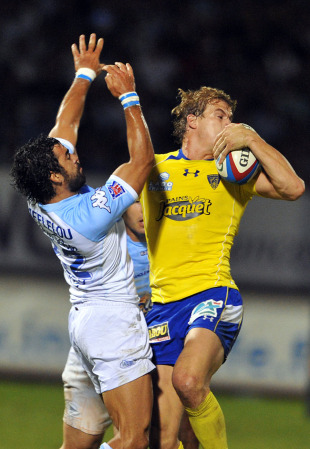|
Top 14
The Top 14's changing face
Ian Moriarty
September 14, 2010

Bayonne's Yoann Huget challenges Clermont's Aurelien Rougerie
© Getty Images
Enlarge
Some say that there is a fine line between winning and losing but consider the fortunes of Bayonne president Francois Salagoity, whose Basque side currently sit three points clear at the summit of the Top 14 table. This is the same Bayonne side that suffered relegation at the end of last season, only to be granted a last-minute reprieve thanks to Montauban's financial woes. Along with Montpellier and Racing Metro, they sit pretty at the top of the table after six topsy-turvy rounds of Top 14 action. More surprisingly still, this is effectively the same Bayonne side as last season, save for the metronomic boot of former Bourgoin star Benjamin Boyet, who joined in the summer. The Basque side's transformation this season from also-rans to play-off hopefuls has been mirrored at Montpellier where new coaches Fabien Galthie and Eric Bechu have been inspirational. Inspired by French internationals Francois Trinh-Duc and Fulgence Ouedraogo, Montpellier's style has been a breath of fresh air compared to some of the stodgy rugby served up elsewhere. Indeed, both clubs have conspired to make this season's opening six rounds some of the most interesting in years. Yet the Top 14 has felt as though it's been morphing little by little over the last few years. Last season's emergence of Racing Metro and Toulon as title challengers, combined with Castres' resurgence, brought added depth to a competition that has effectively been decided by five clubs - Biarritz, Clermont, Toulouse, Perpignan and Stade Francais - in the previous 20 years. Bayonne announced their phoenix-like reappearance with an opening day win in front of shocked punters at Toulon's Stade Mayol while Montpellier did much the same a fortnight later at Perpignan's Stade Aime Giral. So what's brought about this unsettled feel to the league table? There have been nine away victories in the Top 14 so far this term, a number which is by no means unusual. What has been unusual though is the identity of the clubs that have been doing the winning on the road - a feat which is normally reserved for the likes of Toulouse and Clermont. The mantle has been taken on by the likes of Bayonne and Montpellier and the Top 14 has been better for it. Of course not everyone agrees. In his relatively short career as France's national coach, Marc Lièvremont has never been one to shy away from telling it like it is. True to form, the Grand Slam-winning coach was at it again last week on the RMC radio station, lamenting the poor standards of this season's Top 14. He had, like the rest of us, taken time out to watch this year's Tri-Nations and presumably gotten cold shivers down his spine at the thought of taking on the All Blacks. "The Top 14 doesn't prepare the players for the international level," Lièvremont mused. "In terms of creativity, rhythm and individual technique, we are long way from the competitions of the south." Lièvremont was of course, completely correct, but he still missed the point entirely. The question of who serves who in French rugby has been a bugbear of the FFR and the clubs for many a year and won't be solved overnight. The clubs, through their vehicle, the Ligue National de Rugby (LNR) have always done their own thing and as long as significant amounts of money continue to flow into the club game, the tug o' war will continue. Not surprisingly, some of Lièvremont's most vocal critics are to be found in the club ranks and just as night follows day, there are those who believe that the end-of-season international tours are a major reason why the bigger French clubs - and by default the quality of rugby on offer - suffer at the beginning of every season. Toulouse boss Guy Noves is without equal in the European game in terms of experience and silverware and while he's been disappointed by his side's lack of form in their three away defeats, he believes that the bigger French sides have once more been handicapped by their own success. "If you sift through the evidence, Toulouse and Clermont are the two sides that finished the season later than the others," Noves told Midi Olympique last weekend. "And they started back into pre-season training a month and a half later than certain teams." Noves has a point but if truth be told, his position is a world away from the good people of Bayonne and their promotion of substance over style. The Basque side finished last season at the end of April and with no internationals to worry about started pre-season training in the middle of June. Using Noves' logic, their rugby should be a little less one-dimensional. After their close shave last season and fortunate second bite at the cherry this year, who would expect Bayonne to throw the ball around in a willy-nilly "forget relegation" type of way? Because the priority of Francois Salagoity will forever be the survival of his club - a fact that will always be reflected in the rugby they play. © Scrum.com
|
Live Sports
Communication error please reload the page.
-
Football
-
Cricket
-
Rugby
-
- Days
- Hrs
- Mins
- Secs
F1 - Abu Dhabi GP
Abu Dhabi Grand Prix December 11-131. Max Verstappen ()
2. Valtteri Bottas (Mercedes)
3. Lewis Hamilton (Mercedes)
4. Alexander Albon ()
5. Lando Norris ()
6. Carlos Sainz Jr ()
-
ESPNOtherLive >>
Darts - Premier League
Golf - Houston Open
Snooker - China Open
Tennis - Miami Open

